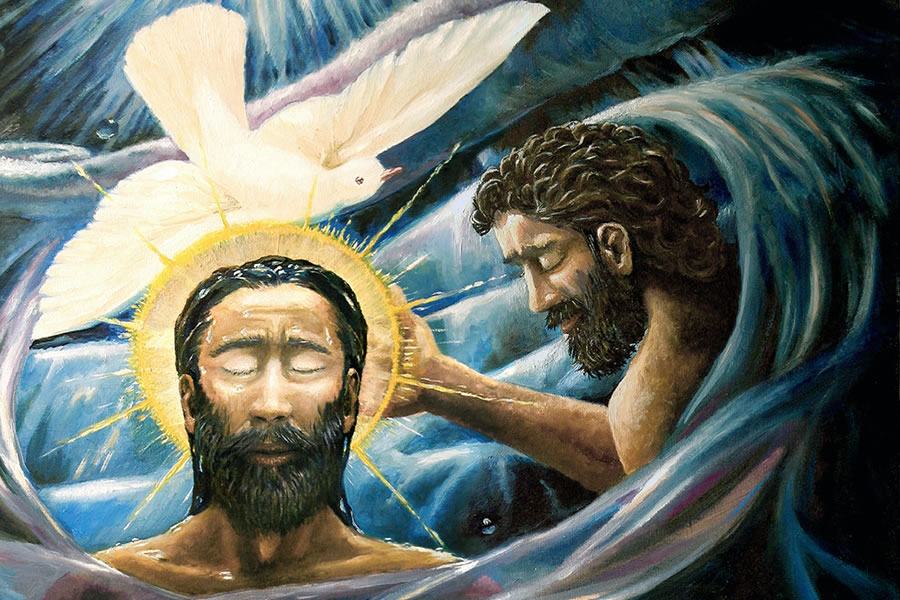St. Francis of Assisi Weekly Reflections

How does your Faith give you Hope?
01-31-2021Weekly ReflectionWe Celebrate Worship Resource, Vol. 46, No. 1In Jesus' time, when someone acted in an abnormal or dangerous way it would often be attributed to unclean spirits. Unclean spirits had powers that could not be controlled. They held people in the grip of overwhelming evil. In order to combat an unclean spirit, someone would need to overpower it. Using the exact name of the demon could give an opponent power over it. Unfortunately, that power worked both ways. Hence, the man with the unclean spirits tries to call Jesus by name. But recognizing Jesus as “the Holy One of God” (Mark 1:24) does not give the demon the power he needs; it merely acknowledges that Jesus was more powerful. Not only is he the Holy One of God, he is God. Jesus, Son of God, the prophet who God promised Moses would be raised up from among the Chosen People, had indeed come to destroy unclean spirits, those that took control over victims two thousand years ago as well as those that take control over our own lives. Naming that evil—addiction, violence, injustice, racism, oppression— continues to give power to the powerless and hope to the hopeless as we call on the Lord to overpower the demons that prey on us and our neighbor.
What evil makes you feel powerless? How can your faith give you hope?
¿Cómo te da Esperanza tu fe?
En la época de Jesús, cuando alguien actuaba de manera anormal o peligrosa, a menudo se atribuía a espíritus inmundos. Los espíritus inmundos tenían poderes que no podían ser controlados. Mantenían a la gente en las garras de un mal abrumador. Con el fin de combatir un espíritu inmundo, alguien tendría que dominarlo. Usar el nombre exacto del demonio podría darle a un oponente poder sobre él. Desafortunadamente, ese poder funcionaba en ambos sentidos. Por lo tanto, el hombre de los espíritus inmundos trataba de llamar a Jesús por su nombre. Pero reconociendo a Jesús como “el Santo de Dios” (Marcos 1:24) no le da al demonio el poder que necesita; simplemente reconoce que Jesús era más poderoso. No sólo es el Santo de Dios, el es Dios. Jesús, el Hijo de Dios, el profeta que Dios le prometió a Moisés que resucitaría entre el Pueblo Elegido, había venido a destruir los espíritus inmundos, los que tomaban el control de las víctimas hace dos mil años, así como los que toman el control de los nuestras vidas. Nombrar ese mal—adicción, violencia, injusticia, racismo, opresión— continúa dándole el poder a los impotentes y esperanza a los desesperados mientras pedimos al Señor que domine a los demonios que nos atacan a nosotros y a nuestro prójimo.
¿Qué maldad te hace sentir impotente? ¿Cómo puede tu fe darte esperanza?
Sharing Goods News
01-31-2021Question of the WeekReading I: Deuteronomy 18:15-20 - A Prophet Like Moses
Reading II: 1 Corinthians 7:32-35 - The State of Virginity
Gospel: Mark 1:21-28 - Cure of a Demoniac
Key Passage:
They were astounded at his teaching, for he taught them as one having authority, and not as the scribes. (Mark 1:22)
Adults: What can you tell others about Jesus with the most assurance?
Kids: What is the most important thing you would like others to know about Jesus? How will you show or tell them?
Compartiendo Las Buenas Noticias
Lectura I: Deuteronomio 18:15-20 - Un profeta como Moisés
Lectura II: 1 Corintios 7:32-35 - El estado de virginidad
Evangelio: Marcos 1:21-28 - La sanación de un demoníaco
Pasaje Clave:
Los oyentes quedaron asombrados de sus palabras, pues enseñaba como quien tiene autoridad y no como los escribas. (Marcos 1:22)
Adultos: ¿Qué le puedes decir a otros acerca de Jesús?
Niños: ¿Qué es lo más importante que te gustaría que los demás supieran acerca de Jesús? ¿Cómo se lo demostrarás o se lo contarás?

You Too, Are a Chosen One
01-24-2021Weekly ReflectionWe Celebrate Worship Resource, Vol. 46, No. 1A new adventure can seem exciting and rewarding. But once it begins it can prove to be difficult and scary. Jonah appears to be enthusiastic and successful prophet in today’s reading. But this is because we skipped past the first two chapters of the book. Jonah initially fled from the challenge of confronting Nineveh and ended up in the belly of a whale. Only after his rescue did he cooperate. It is difficult to imagine anyone responding more quickly and dramatically to Jesus than the first four disciples, leaving family and work behind to follow him. But Simon Peter’s enthusiasm dimmed later. He panicked when Jesus said he would suffer and be put to death (“Get behind me, Satan”) and panicked again when Jesus was condemned to death, denying him three times. Meanwhile, James and John demanded to sit next to the risen Lord in glory. On the night Jesus was arrested, Peter, James, and John fell asleep in Gethesemane after being asked to keep watch. Still, they are the ones on whom the Lord chose to rely. They are flawed human beings, as are we all. Paul warns the Corinthians that “the time is running out” (7:29). May this urgency drive our commitment.
Can you be relied on to carry out Jesus’ mission? What holds you back?
Tú También, eres Uno de los Elegidos
Una nueva Aventura puede parecer emocionante y gratificante. Pero una vez que comienza puede resultar difícil y aterrador. Jonás parece ser un profeta entusiasta y exitoso en la lectura de hoy. Pero esto se debe a que pasamos por alto los dos primeros capítulos del libro. Jonás inicialmente huyó del desafío de enfrentarse a Nínive y terminó en el vientre de una ballena. Sólo después de su rescate sí cooperó. Es difícil imaginar a alguien respondiendo más rápida y dramáticamente a Jesús que los primeros cuatro discípulos, dejando atrás a la familia y el trabajo para seguirlo. Pero el entusiasmo de Simón Pedro se atenuó más tarde. Entró en pánico cuando Jesús dijo que sufriría y sería condenado a muerte (“Quítate de delante de mí, Satanás”) y volvió a entrar en pánico cuando Jesús fue condenado a muerte, negándolo tres veces. Mientras tanto, Santiago y Juan exigieron sentarse junto al Señor resucitado en gloria. La noche que arrestaron a Jesús, Pedro, Santiago y Juan se durmieron en Gethesemaní después de que se les pidiera que vigilaran. Aun así, son ellos en quienes el Señor optó por confiar. Son seres humanos imperfectos, como todos nosotros. Pablo advierte a los corintios que “la vida es corta” (7:29). Que esta urgencia impulse nuestro compromiso.
¿Se puede confiar en ti para llevar a cabo la misión de Jesús? ¿Qué te detiene?
Repent and Believe
01-24-2021Question of the WeekReading I: Jonah 3:1-5, 10 — Conversion of Nineveh
Reading II: 1 Corinthians 7:29-31 — Encouragement Within a Hostile World
Gospel: Mark 1:14-20– Call of the First Disciples
Key Passage:
Now after John was arrested, Jesus came to Galilee, proclaiming the good news of God, and saying, “The time is fulfilled, and the kingdom of God has come near; repent, and believe in the good news.” (Mark 1:14–15)
Adults: What part of your life is Jesus calling you to change right now?
Kids: In what way do you think you can be a better follower of Jesus?
Arrepientanse Y Crean
Lectura I: Jonás 3: 1-5, 10 - Conversión de Nínive
Lectura II: 1 Corintios 7: 29-31 - Aliento en un mundo hostil
Evangelio: Marcos 1: 14-20– Llamado de los primeros discípulos
Pasaje Clave:
Después de que qrrestaron a Juan, Jesús se fue a Galilea para predicar el Evangelio de Dios y decía: “Se ha cumplido el tiempo y el Reino de Dios ya está cerca. Arrepiéntanse y crean en el Evangelio.” (Marcos 1:14-15)
Adultos: ¿Qué parte de tu vida te está llamando Jesús a cambiar ahora mismo?
Niños: ¿De qué manera crees que puedes ser un mejor seguidor de Jesús?

Your Faith Will Transform You
01-17-2021Weekly ReflectionWe Celebrate Worship Resource, Vol. 46, No. 1God’s call tends to leave out explicit directions. The Lord calls Samuel repeatedly, never saying, “I’m right here; don’t keep running over to Eli.” Jesus, when asked where he was staying, doesn’t say, “On the other side of town” or “By the Jordan River.” No, God simply called, “Samuel, Samuel!” (1 Samuel 3:10) and Jesus simply said, “Come and you will see” (John 1:39). No specifics, just invitations. In both cases, the person called needed help from someone who recognized the Lord. For Samuel, it was Eli. For Andrew and the other disciple, it was John the Baptist. In turn, for Simon Peter, it was his brother Andrew. Their lives change after their encounters with the Lord. Samuel’s every word now has effectiveness. Andrew immediately tells his brother, “We have found the Messiah” (1:41). Simon’s name is changed to Cephas (“rock” in Aramaic). No wonder Andrew and his friend appear to remember the exact hour of their conversion: “It was about four in the afternoon.” (1:39). The lives of the first disciples Jesus called have been completely transformed and they will never forget the moment it happened.
Can you recall a time when your faith transformed you?
Tú Fe Te Transformará
El llamado de Dios tiende a omitir instrucciones explícitas. El Señor llama a Samuel repetidamente, sin decir nunca: “Estoy aquí; no sigas corriendo hacia Eli.” Jesús, cuando se le preguntó dónde se estaba quedando, no dijo, “al otro lado de la ciudad” o “junto al río Jordán”. No, Dios simplemente llamó: “¡Samuel, Samuel!” (1 Samuel 3:10) y Jesús simplemente dijo: “Ven y verás” (Juan 1:39). Sin detalles, solo invitaciones. En ambos casos, la persona llamada necesitaba ayuda de alguien que reconociera al Señor. Para Samuel, fue Elí. Para Andrés y el otro discípulo, fue Juan el Bautista. A su vez, para Simón Pedro, fue su hermano Andrés. Sus vidas cambiaron después de sus encuentros con el Señor. Cada palabra de Samuel ahora tiene eficacia. Andrés le dice inmediatamente a su hermano: “Hemos encontrado al Mesías” (1:41). El nombre de Simón se cambio a Kefás (que significa “roca” en arameo). No es de extrañar que Andrés y su amigo parezcan recordar la hora exacta de su conversión: “Eran alrededor de las cuatro de la tarde”. (1:39). Las vidas de los primeros discípulos que Jesús llamó se han transformado por completo y nunca olvidarán el momento en que sucedió.
¿Recuerdas algún momento en que tu fe te transformó?
Come and See
01-17-2021Question of the WeekReading I: 1 Samuel 3:3b-10, 19— Revelation to Samuel
Reading II: 1 Corinthians 6:13c-15a, 17- 20 — Against Sexual Immorality
Gospel: John 1:35-42 - The First Disciples
Key Passage:
They said to him, “ Rabbi” (which translated means Teacher), “where are you staying?” He said to them, “Come and see.” They came and saw where he was staying, and they remained with him that day. (John 1:38b–39)
Adults: What qualities do you have that would cause others to recognize you as a disciple of Jesus?
Kids: What does it take to be a follower of Jesus?
Ven a Ver
Lectura I: 1 Samuel 3: 3b-10,19— Revelación a Samuel
Lectura II: Lectura II 1 Corintios 6: 13c-15a, 17-20 - Contra la inmoralidad sexual
Evangelio: Juan 1: 35-42 - Los Primeros Discípulos
Pasaje Clave:
Ellos le contestaron: “¿Donde vives, Rabí?” (Rabí significa “maestro”). El les dijo: “Vengan a ver.” Fueron, pues, vieron dónde vivía y se quedaron con él ese día. (Juan 1:38b – 39)
Adultos: ¿Qué cualidades tienes que harían que otros te reconozcan como discípulo de Jesús?
Niños: ¿Qué se necesitas para ser un seguidor de Jesús?
The Baptism of the Lord
01-10-2021Question of the WeekReading I: Isaiah 55:1-11 — Invitation to Abundance
Reading II: 1 John 5:1-9 —God's Testimony of Love
Gospel: Mark 1:7-11- The Baptism of Jesus
Key Passage:
“You are my beloved Son; with you I am well pleased.” (Mk 1:11)
Adults: Do you ever feel that you are a beloved child of God and God is well-pleased with you?
Kids: When do you feel most loved?
El Bautismo Del Señor
Lectura I: Isaías 55: 1-11 —Invitación a la Abundancia
Lectura II: 1 Juan 5:1-9—El testimonio de amor de Dios
Evangelio: Marcos 1:7-11- El bautismo de Jesús
“Tú eres mi Hijo amado; yo tengo en ti mis complacencias.” (Mc 1:11)
Adultos: ¿Alguna vez has sentido que eres un hijo amado de Dios y que Dios está muy complacido contigo?
Niños: ¿Cuándo te sientes más amado?

In Baptism, the Holy Spirit Descends Upon Us
01-10-2021Weekly Reflection We Celebrate Worship Resource, Vol. 46, No. 1Among the evangelists, Mark uses the word schizomenous to describe the dramatic way the heavens were “torn open” when Jesus was baptized (Mark 1:10). Through this cleft two important things pass: 1) the Spirit, descending upon Jesus, and 2) the voice of the Father: “You are my beloved Son; with you I am well pleased” (1:11). The divine testifies about the man. This scene foreshadows the one that occurs when Jesus dies on the cross and the veil of the sanctuary is torn in two. At that moment, the centurion exclaims, “Truly this man was the Son of God!” (15:39). A man testifies about the divine. We hear a lot of testimony today. Isaiah testifies about the one who is to come. Peter testifies in the house of the Gentile Cornelius that “God shows no partiality”(Acts 10:34). John explains that the Spirit, water and blood all testify that Jesus is the Son of God, referring to both his baptism and his death. Like the rain and snow of Isaiah’s poem, which descend from the heavens to make the earth fertile and fruitful, the Spirit descends upon on our Lord, rending the fabric that separates the divine from the human. In baptism, the Holy Spirit also descends upon us. May we be fertile soil for God’s word and become fruitful in following God’s call.
How can you be fruitful in this new year?
En el Bautismo, el Espíritu Santo desciende sobre Nosotros
Entre los evangelistas, Marcos usa la palabra esquizomeno (división) para describir la forma dramática en que los cielos fueron “rasgados” cuando Jesús fue bautizado (Marcos 1:10). Por esta hendidura pasan dos cosas importantes: 1) el Espíritu, que desciende sobre Jesús, y 2) la voz del Padre: “Tú eres mi Hijo amado; en ti me complazco” (1:11). Lo divino testifica sobre el hombre. Esta escena presagia la que ocurre cuando Jesús muere en la cruz y el velo del santuario se rasga en dos. En ese momento, el centurión exclama: “¡Verdaderamente este hombre era el Hijo de Dios!” (15:39). Un hombre da testimonio de lo divino. Hoy escuchamos muchos testimonios. Isaías testifica sobre el que ha de venir. Pedro testifica en la casa del gentil Cornelio que “Dios no hace distinción de personas” (Hechos 10:34). Juan explica que el Espíritu, el agua y la sangre testifican que Jesús es el Hijo de Dios, refiriéndose tanto a su bautismo como a su muerte. Como la lluvia y la nieve del poema de Isaías, que descienden de los cielos para hacer la tierra fértil y fecunda, el Espíritu desciende sobre nuestro Señor, rasgando el tejido que separa lo divino de lo humano. En el bautismo, el Espíritu Santo también desciende sobre nosotros. Que seamos tierra fértil para la palabra de Dios y seamos fructíferos al seguir el llamado de Dios.
¿Cómo puedes ser fructífero en este nuevo año?
Overcoming Jealously
01-03-2021Question of the WeekReading I: Isaiah 60:1-6 - Glory of the New Zion
Reading II: Ephesians 3:2-3a, 5-6 - Commission to Preach God's Plan
Gospel: Matthew 2:1-12 - The Visit of the Magi
Key Passage:
Then Herod sent the [magi] to Bethlehem, saying, “Go and search diligently for the child; and when you have found him bring me word so that I may also go and pay him homage.” (Matthew 2:8)
Adults: When have you been jealous or fearful of another person? When are such feelings harmful?
Kids: When have you been jealous because something good happened to another person instead of you? What is the problem with feeling that way?
Superando los Celos
Lectura I: Isaías 60: 1-6 - Gloria de la Nueva Sión
Lectura II: Efesios 3: 2-3a, 5-6 -Comisión para predicar el plan de Dios
Evangelio: Mateo 2: 1-12 - La visita de los Magos
Pasaje Clave:
Herodes, enviándolos a Belén, dijo: “Vayan y busquen con diligencia al Niño; y cuando lo encuentren, avísenme para que yo también vaya y lo adore.”
Adultos: ¿Cuándo has tenido celos de otra persona? ¿Cuándo son dañinos estos sentimientos?
Niños: ¿Cuándo has estado celoso porque le pasó algo bueno a otra persona en lugar de a ti? ¿Cuál es el problema con sentirte así?

Welcoming the “Others”
01-03-2021Weekly ReflectionWe Celebrate Worship Resource, Vol. 46, No. 1Many millennia ago, all humanity was considered one family. Witness Abraham, common ancestor of Jews, Christians, and Muslims. But as time went on and generations passed, the family tree expanded to the point that divisions became easier to notice than unity. Isaiah mentions the foreign lands of Midian, Ephah, and Sheba, all located on the Arabian Peninsula. Midian was Abraham's son by his second wife, half brother to Isaac. Ephah was Midian's son and Sheba was the son of Midian's brother. But by Isaiah's time, the people of these nations were no longer part of Abraham's family's reunions. They may have been trading partners or they may have been rivals, but they were definitely "others". Isaiah saw it differently. These "others", these foreigners with different traditions and different customs were drawn to the holy city as well. Not only did they visit, they came with caravans of riches and voices of praise to God. Centuries later, Jesus draws foreigners, wise men, who also bring riches and praise to God. Some (Herod) prefer to see differences rather than unity (this "king of the Jews" consituted a threat to his position), but Paul asserts what we too should realize: like Jews and Gentiles, we—black or white, host or immigrant, English or Spanish—are all "members of the same body" (Ephesians 3:6).
How can you welcome "others" as Isaiah, Paul, and the Holy Family did?
Dándole la Bienvenida a los "Otros"
Hace muchos milenios, toda la humanidad era considerada una familia. Veamos a Abraham, antepasado común de judíos, cristianos y musulmanes. Pero a medida que pasaba el tiempo y pasaban las generaciones, el árbol genealógico se expandió hasta el punto de que las divisiones se volvieron más fáciles de notar que la unidad. Isaías menciona las tierras extranjeras de Madián, Efa y Sabá, todas situadas en la Península Arábiga. Madián era hijo de Abraham de su segunda esposa, medio hermano de Isaac. Efa era el hijo de Madián y Sabá era el hijo del hermano de Madián. Pero para la época de Isaías, el pueblo de estas naciones ya no era parte de las reuniones familiares de Abraham. Pueden haber sido socios comerciales o pueden haber sido rivales, pero definitivamente eran los “otros”. Isaías lo vio de manera diferente. Estos “otros”, estos extranjeros con diferentes tradiciones y diferentes costumbres fueron atraídos también a la ciudad santa. No sólo visitaron, vinieron con caravanas de riquezas y voces de alabanza a Dios. Siglos más tarde, Jesús atrae a extranjeros, sabios, que también traen riquezas y alabanza a Dios. Algunos (Herodes) prefieren ver las diferencias en lugar de lo común (este “rey de los judíos” constituía una amenaza para su posición), pero Pablo afirma lo que nosotros también debemos darnos cuenta: como judíos y Gentiles, nosotros, negros o blancos, anfitriones o inmigrantes, ingles o español, somos todos “miembros del mismo cuerpo” (Efesios 3:6).
¿Cómo puedes darle la bienvenida a “otros” como lo hicieron Isaías, Pablo y la Sagrada Familia?